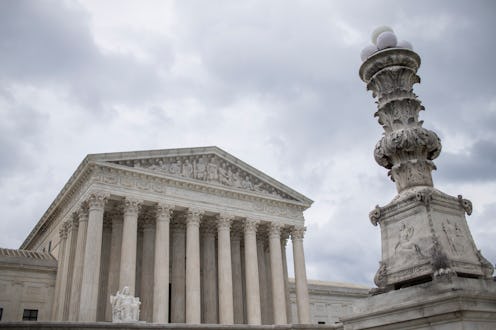
When shortlists for Supreme Court nominees are released, it's customary to examine any part of them that could potentially impact the way that they would make decisions from the bench. Such is the case for potential Supreme Court nominee Amy Coney Barrett, who is being scrutinized for reportedly belonging to a religious group known as "People of Praise." What, exactly, the religious group is appears to be up for debate.
The group, founded in South Bend, Indiana, describes itself on its website as a "charismatic and ecumenical, a covenant community." While most of their members are reportedly Catholic, being ecumenical means that they welcome members from various types of Christian churches.
Discussion surrounding Barrett's reported membership in the group — People of Praise doesn't, as a rule, publicly confirm anyone's membership, per The New York Times, — first entered the mainstream in 2017, during Barrett's confirmation hearings for the U.S. Circuit Court of Appeals. Because of their line of questioning concerning Barrett's professed Roman Catholicism, some Democrat Senators were accused of being religiously intolerant.
"Dogma and law are two different things," Sen. Dianne Feinstein told Barrett at the time "And I think whatever a religion is, it has its own dogma. The law is totally different. And I think in your case, professor, when you read your speeches, the conclusion one draws is that the dogma lives loudly within you, and that’s of concern."
The New York Times reported at the time that Barrett assured senators that her faith would not affect her judicial decisions. But, as the Times further pointed out, her affiliation with People of Praise has raised eyebrows. Much of the concern stems from the way that the tight-knit community organizes itself.
As the Times explained in a report issued around the time of Barrett's hearings — and as is corroborated by the People of Praise website — after a period of time, members can opt to enter a covenant with the group. A covenant, in layman's terms, is a lifelong oath. And while that may sound odd to the uninitiated, it's a term regularly used by many Christian denominations, often to describe the church's relationship with God. The People of Praise website maintains that its members enter these covenants freely.
After they do so, those members are supposed to commit to surrendering 5 percent of their income to a joint church fund which People of Praise says "supports community outreaches, staff and charitable service to the poor." This is a standard practice in churches — many, in fact, ask for 10 percent. They are then reportedly assigned to a same-sex personal advisor. Until recently, those were called "heads" for men, and "handmaidens" for women. Reportedly, per the Times, those advisors provide serious life guidance, and can influence decisions like buying a home or choosing who to marry. Many members also choose live in close together, in similar neighborhoods.
Craig Lent, People of Praise's current leader, told Slate that the organization was originally inspired by, as Slate describes it, "the communitarian ethos of the 1960s counterculture." Lent told the website that the lifelong oath was about making a commitment "to care for each other physically, financially, materially, and spiritually."
As for the term "handmaiden," that was chosen long before Margaret Atwood's novel The Handmaid's Tale would forever alter the term's societal connotation. A spokesperson fro People of Praise told Heavy that the word was initially intended to evoke Mary, Jesus’s mother, who described herself as "the handmaid of the Lord." They have since chosen to refer to female leaders as simply "woman leaders."
Though People of Praise has not confirmed Barrett's membership, she has reportedly been featured in stories previously linked on the group's page, and formerly served on the board of trustees for a school that they run, according to the Times. Those on the board of trustees are required to be church members.
Whether or not People of Praise adheres to any specific political ideals is not clear. Barrett, herself, is a known conservative, and it isn't uncommon for Christian communities to bolster such conservatism. Their website, however, is not expressly political in nature.
At the heart of the concern for some critics is that the intensive commitment that the group requires could not be reasonably separated from Barrett's legal judgement. Some have even gone so far to describe the group as "a secretive religious cult." Whatever the case, if she is nominated, chances are that Barrett will face intense questioning, particularly by Democrats, concerning her affiliation with the group. It's up to her to choose how she will characterize her beliefs.